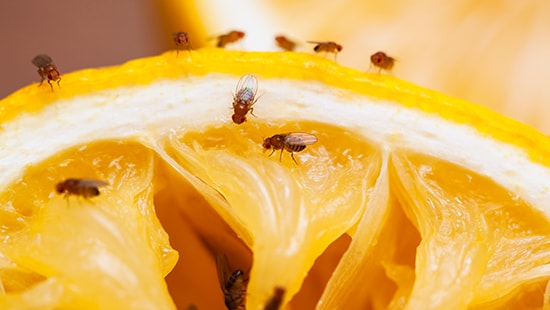Fruit Flies — What They Eat, Dangers & Preventions

There are more than 1,500 types of fruit flies across the world, but the common fruit fly is most commonly found in homes, according to research. In one week, a single pair of fruit flies can create up to 500 offspring. These small bugs may look harmless, but they can rapidly infest your kitchen and other rooms in your home.
Fruit flies can enter your home through the smallest openings or catch a ride on the fruits and vegetables that come home from the grocery store. In such situations, it becomes important to seek professional help, and for the same, you can contact Saela Pest Control, which can assist you.
Meanwhile, let us take a detailed look at fruit flies, including what they are exactly, what they eat, dangers, etc. We will also look at the ways you can prevent them from entering your home in this blog post below.
What Are Fruit Flies Exactly?
The common name fruit fly refers to small flies from the family Drosophilidae. These puny insects, however, are amazing long-distance sniffers that can locate fermenting fruit from far away.
Fruit flies also do especially well in and around moist, warm environments—making kitchens, restaurants, grocery stores, and all other food storage and preparation areas home as well. They also have a short life cycle, reproducing in 8-10 days after reaching adulthood, when conditions are most favorable.
What Do Fruit Flies Eat?
Its diet consists mainly of fermenting or decaying organic material. As their name implies, they are especially drawn to ripe or overripe fruits such as bananas, melons, and berries. But they eat a lot more than fruit.
These insects will munch away at vegetables, wine, beer, vinegar and more
Dangers of Fruit Flies
Fruit flies do not bite or sting, but they can carry several health and home risks, including:
- Fruit flies can carry and spread bacteria
When they land on food, they can transfer harmful microorganisms from contaminated surfaces such as garbage cans, drains, or animal feces. Research has shown that fruit flies carry more than 100 different bacteria, such as Salmonella, E. coli, and Listeria.
- Fruit Flies Can Cause Food Contamination
- Direct contamination: Fruit flies lay eggs on fruits and vegetables. A female can lay about 500 eggs at a time, and those eggs hatch into larvae (maggots) that feed on the food.
- Quickened spoilage: The molecules released by ethylene-producing fruits and vegetables can cause the decay process to quicken, resulting in food waste and increased costs.
- They Can Cause Allergic Reactions
People prone to allergic reactions to fruit fly proteins may notice banal symptoms as well. Such reactions vary from mild skin irritation to respiratory problems in susceptible people. Note that if you see any allergic symptoms, you should speak to a doctor.
How Can You Prevent Fruit Flies In Your Home?
As fruit flies tend to infest the food and breeding grounds, keeping them at bay is, therefore, a multi-pronged approach:
- Sink drains accumulate organic matter like grease, hair, and soap scum, and these can be removed using a brush and some cleaning solution.
- Empty trash, particularly food waste, daily or every other day.
- Store food in sealed containers, particularly fruits and vegetables.
- Fix any plumbing problems that lead to wet conditions.
- Indoor compost bins should have a tight-fitting lid.
- Wash pet food bowls and areas where pets eat regularly.
- Refrigerate ripe fruits
Speak to a Pest Control Service
If you have done everything you can to prevent the issue from persisting, it might be time to hire someone who can help. Pest control professionals are capable of locating undetectable breeding grounds and providing targeted treatments that will eradicate fruit flies entirely. They can also give personalized tips on how to prevent further infestations based on the specifics of your home layout and habits.






